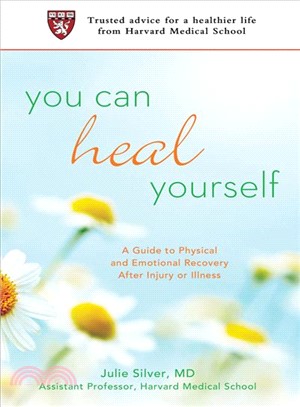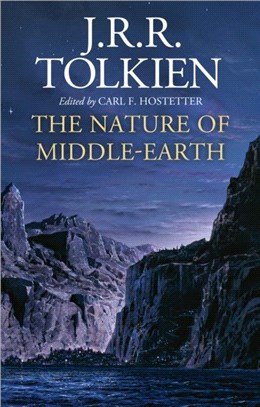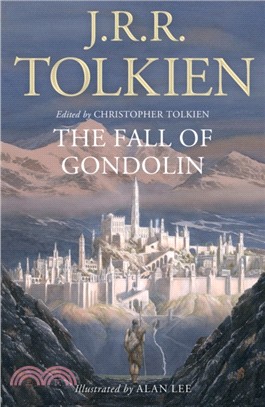You Can Heal Yourself
商品資訊
ISBN13:9780312605803
替代書名:You Can Heal Yourself
出版社:St Martins Pr
作者:Julie Silver M.D.
出版日:2012/01/31
裝訂/頁數:平裝/262頁
規格:20.3cm*14.0cm*1.9cm (高/寬/厚)
商品簡介
作者簡介
名人/編輯推薦
書摘/試閱
相關商品
商品簡介
How to heal faster, better, and stronger during recovery from a serious illness or injury—a Harvard doctor's complete recovery plan
When people are seriously ill or injured, they receive immediate and often life-sustaining treatment. Then at some point they are usually left to their own devices to “finish” healing. At the time that patients are discharged from treatment or their doctors tell them, “I don’t have anything else I can offer you,” they are often shifted into a zone where they are better than at their sickest point, but not as healthy as they once were. This zone, between illness and good health, is where rehabilitation specialists focus. Dr. Silver calls this area of medicine, where physiatrists work, The Healing Zone. This is the place where doctors are most concerned with physical and emotional healing after an injury
or illness.
Our bodies are amazing in their capacity to heal, however, people can be taught how to heal faster, better, and stronger, both physically and emotionally. You Can Heal Yourself offers the strategies needed to achieve optimal healing.
When people are seriously ill or injured, they receive immediate and often life-sustaining treatment. Then at some point they are usually left to their own devices to “finish” healing. At the time that patients are discharged from treatment or their doctors tell them, “I don’t have anything else I can offer you,” they are often shifted into a zone where they are better than at their sickest point, but not as healthy as they once were. This zone, between illness and good health, is where rehabilitation specialists focus. Dr. Silver calls this area of medicine, where physiatrists work, The Healing Zone. This is the place where doctors are most concerned with physical and emotional healing after an injury
or illness.
Our bodies are amazing in their capacity to heal, however, people can be taught how to heal faster, better, and stronger, both physically and emotionally. You Can Heal Yourself offers the strategies needed to achieve optimal healing.
作者簡介
JULIE SILVER, MD is an assistant professor at Harvard Medical School in the Department of Physical Medicine and Rehabilitation. She is an award-winning author and has edited/written more than 20 books that focus on rehabilitation medicine and physical recovery. Dr. Silver is currently on the medical staffs of several major hospitals in Massachusetts, including Brigham and Womens, Massachusetts General, Spaulding, and UMass Memorial. In addition to her clinical work as a physiatrist, Dr. Silver is the Chief Editor of Books at Harvard Health Publications and a founder of Oncology Rehab Partners.
名人/編輯推薦
Praise for AFTER CANCER TREATMENT by Julie Silver, MD:
"A hands-on guide to survival...Highly recommended." —Library Journal
"A hands-on guide to survival...Highly recommended." —Library Journal
書摘/試閱
YOU CAN HEAL YOURSELF (Chapter 1)Listen to Your Healing Voice
Kathleen sat in the cold metal chair of the hospital waiting room anxiously watching the organized chaos. The room itself was unattractive, with graying tile floors and not enough seats, which is why she was sitting on a folding chair. Finally, the nurse called her name, loud enough for everyone to hear, though the others seemed oblivious. Kathleen jumped up, eager to move away from the crowded room. The nurse led her to a tiny changing room where she hung her clothes and donned a hospital gown. The next stop was a private room where an ultrasound technician was waiting.
The technician was efficient in her routine but then she hesitated over a suspicious area. "I'll be right back," she said. Kathleen waited. Finally, the technician came back. "The doctor will be here in a minute. I just want him to check something." When the doctor arrived, he stood across the room as the technician moved the ultrasound machine over Kathleen's body. "This is what I wanted to show you," she told him. "That's nothing, just a lymph node," he explained curtly and then left the room without ever speaking to Kathleen.
Kathleen dressed silently, relieved to be going home. Relieved that everything was fine. Or at least, she told herself that she was relieved. But, the truth was, she didn't feel relieved. She was worried. Yes, the waiting room was ugly and unfriendly. The nurse was indifferent to the rules regarding patient privacy; the doctor was arrogant and rude. Still, did that mean that she couldn't trust the test and the doctor's conclusion?
Over the next couple of weeks, Kathleen decided that she didn't trust the doctor. He obviously hadn't cared and she wanted to at least find a doctor who seemed to care. One she could trust to help her if something was wrong. So, she made an appointment to see another doctor, a woman in a different hospital who came highly recommended.
The woman was a breast surgeon, and she was used to looking at all kinds of lumps and bumps from worried women. This time, the waiting room was more welcoming, the nurse more discreet, and the doctor more caring. Kathleen had the tests repeated. The doctor told her, "I can't feel anything when I examine you, and the tests are all negative. There is no evidence that anything is wrong."
Kathleen left, and again was relieved. Relieved to be going home to her baby and other children. Relieved to tell her husband that all was well. Relieved that she had found a doctor who didn't stand across the room and dismiss her concerns with barely a nod in her direction. And so, she went back to her regular life. With three children to raise, there wasn't much time to worry. Besides, she was fine. Two doctors had told her so. Multiple tests had been normal. She was fine. Or was she?
Two years later, Kathleen realized that she was still worried. She had been worried off and on, but for the most part had convinced herself that she must be acting a bit hypochondriacally. After all, she was young and healthy. Too young for a serious health problem--even the tests confirmed this.
She went back to the female breast surgeon. More tests ensued. This time, her doctor said, "You were right. You have cancer."
Kathleen is my middle name, and this is my story.
Entering the Healing Zone
Many people have asked me, "How did you know something was wrong when your doctors and the tests didn't show anything?" The simple answer is that we all have incredible knowledge about our own bodies that far exceeds what anyone else could ever know. This doesn't mean that doctors and medical tests aren't extremely valuable. They are. But, they don't always know or reveal what you know about your body. You have amazing and very intimate knowledge about your body, which makes you a powerful healer when it comes to healing yourself. Of course, it would be wonderful if you weren't in need of healing, but all of us enter what the late author Susan Sontag called the "kingdom of the sick" at various points in our lives. In a vivid description in Illness as Metaphor, Sontag wrote:
Illness is the night-side of life, a more onerous citizenship. Everyone who is born holds dual citizenship, in the kingdom of the well and in the kingdom of the sick. Although we all prefer to use only the good passport, sooner or later each of us is obliged, at least for a spell, to identify our selves as citizens of that other place.
The great irony with cancer is that usually you begin treatment feeling great but know that something terrible is going on inside your body. By the end of treatment you are physically debilitated but often feel grateful that treatment was even possible. In Flying Crooked, Jan Michael describes it this way: "Such a weird disease, creeping through your body without your noticing. First you have lumps, but you feel fine. You're whisked into hospital and they mutilate you, and suddenly, you're not fine at all."
As a cancer patient, I had to live in what I call "the Healing Zone" for a couple of years. The Healing Zone is a place where a lot of patients get stuck and many never heal optimally--instead, accepting a "new normal" and a higher-than-needed level of pain, fatigue, weakness, disability, and emotional turmoil.
As a physician who specializes in rehabilitation medicine, I have worked for many years with patients who are in the Healing Zone. I treat people with many different kinds of conditions, including--but not limited to--cancer, stroke, multiple sclerosis, traumatic brain injuries, sports injuries, neck and low back pain, and just about any other condition in which healing is required. I also treat individuals with orthopedic conditions that range from sprained ankles and knees to serious multitrauma injuries due to car accidents and physical violence.
As a cancer patient, when I had been given my last chemotherapy treatment, my oncologist told me, "Now get on with the rest of your life." This was simultaneously both heartening and disheartening. I was delighted to move forward, but I was a physical wreck. Emotionally, I was depleted. My doctor's work was done--he had rid me of my cancer and, save for the occasional checkup to be sure it did not reappear, I was on my own. I pause here to say that I had outstanding care and that my doctors were dedicated and smart, and worked hard to save my life. However, like so many people, there came a time when I was on my own and still in need of healing.
Many patients turn to self-help books during times of illness, and I was no different. During my recovery, I searched for books that focused on healing--both physically and emotionally. I was surprised to find that despite the hundreds of books on cancer, there wasn't a single book devoted to how survivors could best heal. Because I wanted a guide, and I knew that there were many others who could benefit, too, I wrote After Cancer Treatment: Heal Faster, Better, Stronger--a book specifically for cancer survivors about how to heal optimally. As I wrote it, however, I realized that much of the advice was the same as what I was giving to my patients who had many different illnesses and injuries. This is because there are many universal healing principles that really work to help us optimally recover both physically and emotionally.
Helping people to heal optimally is what physiatrists do every day. Physiatrists (doctors who specialize in "rehabilitation medicine"--technically referred to as Physical Medicine and Rehabilitation, or PM&R) focus on how to bridge the gap between what one's body can do to heal without any assistance and what one's body can do with evidence-based medical advice that allows for optimal healing.
My story is similar to many people's stories, regardless of whether they were diagnosed with cancer or some other illness. There is so much untapped potential for healing and far too many of us struggle with weakness, fatigue, pain, and other symptoms that can be improved or sometimes eliminated altogether. There is no doubt that any kind of illness or injury negatively impacts our lives. As you read this book, remember that illness makes you feel vulnerable and healing makes you powerful.
Beginning to Heal
Physiatrists tend to have a very "holistic" approach to healing and recognize the importance of using many different treatment strategies as well as an individual's inner resources. So, as I began to heal, I thought about my years of medical training and practice. Faced with my desire to recover quickly and to feel physically and emotionally stronger, I had to distill an incredible amount of knowledge into some basic healing principles that I could follow. I was too ill to think about, much less implement, all of the various healing methods I knew. Instead, I had to decide what are the best ways? What are the main principles in healing, and how can I achieve them with the least effort?
In order to figure this out, I had to start really listening to my healing voice. This is something I tell my patients all the time: Listen to your body; what is it telling you? Try thinking about these questions (write down the answers if you want to):
Are you in pain?Where does it hurt?When does it hurt?What makes it better?What makes it worse?Do you feel fatigued?Do you have any problems falling asleep, staying asleep, or sleeping well?When are you most fatigued?When are you least fatigued?What makes you less tired?What makes you more tired?Other than sleep, are there things you can do to pick up your energy?Do you feel weak?What is the weakest part of your body?What is the strongest part of your body?What parts of your body do you have confidence in and trust to work well?What parts of your body are you worried about?What makes you currently feel sad? Worried? Anxious? Depressed? Angry?What makes you currently feel happy? Relieved? Peaceful?What do you think will help you to heal as well as possible?
When I start asking a patient who has come to my office in pain these types of questions, it's not uncommon that he or she has to stop and think about the answers. When we're busy living our lives, we often don't really pay attention to how we feel physically and emotionally. Perhaps it seems a little narcissistic--overly focused on one's self. Or, maybe we're just too busy. Possibly, it's just easier to think about other things. Whatever the reason, in order to begin to heal, listening to your healing voice is an important first step. You know your body better than anyone else. You have intimate knowledge of how your body works and feels that no doctor could ever have, no matter how many years of medical training she had.
While this book is on how to heal yourself, and I acknowledge that you know more about your body than any physician ever could, it still is really important to get good medical advice. As a patient, I relied on my physicians to help me. Their care was essential to my well-being, and while I think individuals can do a great deal to help themselves heal, I also believe in getting excellent medical advice all along the way.
Before I could write After Cancer Treatment: Heal Faster, Better, Stronger, I had to work on healing myself. This process forced me to synthesize the medical research and develop a recovery plan for cancer survivors. When I felt well enough and began to write the book, I thought about how the healing principles are really the same for the vast majority of people I treat. There are core principles that I used to heal myself, described in that book, and discuss daily with patients who come to my office. These core principles are based on thousands of research studies and many years of my listening to patients tell me what helps them and what doesn't.
You Can Heal Yourself is based on the best medical research currently available along with common sense, intuition, and a lot of experience treating people who are in need of physical and emotional healing. In conventional medicine, what we refer to as "evidence-based" medicine, research is paramount. We rely heavily on the results of studies that show us what works and what doesn't. However, there are many gaps in research, and to fill these voids doctors utilize common sense, intuition, and experience. These skills are what make up the "art" of medicine. A skilled physician is both a scientist and an artist.
Before this book came out, I put the cover of it in a slide presentation I was giving to a group of cancer survivors. Afterward, the director of the cancer center asked me whether this book was about curing cancer, even at the end stage. She cornered me with obvious criticism in her voice. After all, is it really fair to encourage people to heal if they don't have a good prognosis? I explained to her I don't want to suggest that every illness has a cure, but that too many people suffer far more than they need to--whether they currently live with an illness or are simply suffering from the aftereffects of one.
She brought up late stage cancer (stage 4), which I think is a worthwhile example to explore. Certainly, some people who are diagnosed with stage 4 cancer will be cured. Lance Armstrong is an example of someone who was cured despite the cancer spreading to distant parts of his body (that's the criteria for stage 4--distant spread of the cancer, or metastasis). However, many people with stage 4 cancer will not be cured, but rather will live with cancer as a chronic condition. Prostate cancer is typically diagnosed in men over the age of fifty years. Often it is diagnosed in the early stages, but sometimes the cancer has spread. It is not uncommon for men with prostate cancer that is stage 4 to suffer from debilitating side effects of treatment but still have a relatively good prognosis. This means they can benefit from healing but may live for years with cancer as a chronic condition.
Statistics don't always predict any one person's outcome. Statistics give us information about what may happen, but there are no guarantees. Putting a positive spin on this means it's important to remember that even when the prognosis is grim, there are outliers--people who don't follow the statistics. It's usually not clear why this happens, but giving every person the opportunity to live as healthy a life as possible is critical. It's difficult to predict how or why some people "beat the odds." For example, in 1988, Katherine Russell Rich was diagnosed with breast cancer. Five years later, she was told by her doctors that her cancer had progressed to stage 4, and she had less than two years to live. For many years, she has taught at a publishing course that I direct at Harvard Medical School. Though she clearly has had some health issues, Kathy travels from New York to Boston and teaches memoir writing--which gets rave reviews from the attendees.
In 2010, Kathy wrote an article for The New York Times titled "17 Years Later, Stage 4 Survivor Is Savoring a Life Well Lived." I can't explain Kathy's longevity, but what is important to note is that it's not always easy to predict what will happen with people when they are ill. Even if they live with a very serious illness, during their lifetime they deserve to live with the highest possible level of health. Every day that they can feel stronger and have more energy and less fatigue is worthwhile. Year after year, Kathy has had the physical and emotional strength to travel and teach. She has been a powerful influence on the lives of many people.
So, although I understand the cancer center director's concerns, I want to share with readers that healing is not always about curing an illness, but rather is focused on living the best life you can despite certain health circumstances that may be out of your control.
In this book, I combine the art and science of medicine into strategies that will allow you to heal yourself as well as possible--physically and emotionally--no matter what problems you are facing. I don't focus on "cure," but rather on helping your mind and your body to be as strong as possible, even if you live with a medical condition such as cancer, diabetes, or arthritis. This information will help you tap into and mobilize your own healing resources. These resources will assist you in "bumping up" your level of health and becoming a little, or hopefully even a lot, stronger, even if there isn't a cure for whatever it is that you are suffering with. And, the first step is simply to listen to your healing voice: What is it telling you?
Healing Strategies
Analyze Your Weaknesses and Study Your Strengths
As you begin to listen to your healing voice, it's important to focus not only on the negative messages that you are receiving, but also the positive ones. What problems are you having and what is working well for you? Try this exercise to help you focus on where you might have room to heal and at the same time appreciate your mind and your body right now.
List three ways that you wish your body would function better.List three ways that you wish your mind (or emotions) would function better.List three things that you like about your body and trust it to do well.List three things that you like about your mind (or emotions) and trust it to do well.
Kathleen sat in the cold metal chair of the hospital waiting room anxiously watching the organized chaos. The room itself was unattractive, with graying tile floors and not enough seats, which is why she was sitting on a folding chair. Finally, the nurse called her name, loud enough for everyone to hear, though the others seemed oblivious. Kathleen jumped up, eager to move away from the crowded room. The nurse led her to a tiny changing room where she hung her clothes and donned a hospital gown. The next stop was a private room where an ultrasound technician was waiting.
The technician was efficient in her routine but then she hesitated over a suspicious area. "I'll be right back," she said. Kathleen waited. Finally, the technician came back. "The doctor will be here in a minute. I just want him to check something." When the doctor arrived, he stood across the room as the technician moved the ultrasound machine over Kathleen's body. "This is what I wanted to show you," she told him. "That's nothing, just a lymph node," he explained curtly and then left the room without ever speaking to Kathleen.
Kathleen dressed silently, relieved to be going home. Relieved that everything was fine. Or at least, she told herself that she was relieved. But, the truth was, she didn't feel relieved. She was worried. Yes, the waiting room was ugly and unfriendly. The nurse was indifferent to the rules regarding patient privacy; the doctor was arrogant and rude. Still, did that mean that she couldn't trust the test and the doctor's conclusion?
Over the next couple of weeks, Kathleen decided that she didn't trust the doctor. He obviously hadn't cared and she wanted to at least find a doctor who seemed to care. One she could trust to help her if something was wrong. So, she made an appointment to see another doctor, a woman in a different hospital who came highly recommended.
The woman was a breast surgeon, and she was used to looking at all kinds of lumps and bumps from worried women. This time, the waiting room was more welcoming, the nurse more discreet, and the doctor more caring. Kathleen had the tests repeated. The doctor told her, "I can't feel anything when I examine you, and the tests are all negative. There is no evidence that anything is wrong."
Kathleen left, and again was relieved. Relieved to be going home to her baby and other children. Relieved to tell her husband that all was well. Relieved that she had found a doctor who didn't stand across the room and dismiss her concerns with barely a nod in her direction. And so, she went back to her regular life. With three children to raise, there wasn't much time to worry. Besides, she was fine. Two doctors had told her so. Multiple tests had been normal. She was fine. Or was she?
Two years later, Kathleen realized that she was still worried. She had been worried off and on, but for the most part had convinced herself that she must be acting a bit hypochondriacally. After all, she was young and healthy. Too young for a serious health problem--even the tests confirmed this.
She went back to the female breast surgeon. More tests ensued. This time, her doctor said, "You were right. You have cancer."
Kathleen is my middle name, and this is my story.
Entering the Healing Zone
Many people have asked me, "How did you know something was wrong when your doctors and the tests didn't show anything?" The simple answer is that we all have incredible knowledge about our own bodies that far exceeds what anyone else could ever know. This doesn't mean that doctors and medical tests aren't extremely valuable. They are. But, they don't always know or reveal what you know about your body. You have amazing and very intimate knowledge about your body, which makes you a powerful healer when it comes to healing yourself. Of course, it would be wonderful if you weren't in need of healing, but all of us enter what the late author Susan Sontag called the "kingdom of the sick" at various points in our lives. In a vivid description in Illness as Metaphor, Sontag wrote:
Illness is the night-side of life, a more onerous citizenship. Everyone who is born holds dual citizenship, in the kingdom of the well and in the kingdom of the sick. Although we all prefer to use only the good passport, sooner or later each of us is obliged, at least for a spell, to identify our selves as citizens of that other place.
The great irony with cancer is that usually you begin treatment feeling great but know that something terrible is going on inside your body. By the end of treatment you are physically debilitated but often feel grateful that treatment was even possible. In Flying Crooked, Jan Michael describes it this way: "Such a weird disease, creeping through your body without your noticing. First you have lumps, but you feel fine. You're whisked into hospital and they mutilate you, and suddenly, you're not fine at all."
As a cancer patient, I had to live in what I call "the Healing Zone" for a couple of years. The Healing Zone is a place where a lot of patients get stuck and many never heal optimally--instead, accepting a "new normal" and a higher-than-needed level of pain, fatigue, weakness, disability, and emotional turmoil.
As a physician who specializes in rehabilitation medicine, I have worked for many years with patients who are in the Healing Zone. I treat people with many different kinds of conditions, including--but not limited to--cancer, stroke, multiple sclerosis, traumatic brain injuries, sports injuries, neck and low back pain, and just about any other condition in which healing is required. I also treat individuals with orthopedic conditions that range from sprained ankles and knees to serious multitrauma injuries due to car accidents and physical violence.
As a cancer patient, when I had been given my last chemotherapy treatment, my oncologist told me, "Now get on with the rest of your life." This was simultaneously both heartening and disheartening. I was delighted to move forward, but I was a physical wreck. Emotionally, I was depleted. My doctor's work was done--he had rid me of my cancer and, save for the occasional checkup to be sure it did not reappear, I was on my own. I pause here to say that I had outstanding care and that my doctors were dedicated and smart, and worked hard to save my life. However, like so many people, there came a time when I was on my own and still in need of healing.
Many patients turn to self-help books during times of illness, and I was no different. During my recovery, I searched for books that focused on healing--both physically and emotionally. I was surprised to find that despite the hundreds of books on cancer, there wasn't a single book devoted to how survivors could best heal. Because I wanted a guide, and I knew that there were many others who could benefit, too, I wrote After Cancer Treatment: Heal Faster, Better, Stronger--a book specifically for cancer survivors about how to heal optimally. As I wrote it, however, I realized that much of the advice was the same as what I was giving to my patients who had many different illnesses and injuries. This is because there are many universal healing principles that really work to help us optimally recover both physically and emotionally.
Helping people to heal optimally is what physiatrists do every day. Physiatrists (doctors who specialize in "rehabilitation medicine"--technically referred to as Physical Medicine and Rehabilitation, or PM&R) focus on how to bridge the gap between what one's body can do to heal without any assistance and what one's body can do with evidence-based medical advice that allows for optimal healing.
My story is similar to many people's stories, regardless of whether they were diagnosed with cancer or some other illness. There is so much untapped potential for healing and far too many of us struggle with weakness, fatigue, pain, and other symptoms that can be improved or sometimes eliminated altogether. There is no doubt that any kind of illness or injury negatively impacts our lives. As you read this book, remember that illness makes you feel vulnerable and healing makes you powerful.
Beginning to Heal
Physiatrists tend to have a very "holistic" approach to healing and recognize the importance of using many different treatment strategies as well as an individual's inner resources. So, as I began to heal, I thought about my years of medical training and practice. Faced with my desire to recover quickly and to feel physically and emotionally stronger, I had to distill an incredible amount of knowledge into some basic healing principles that I could follow. I was too ill to think about, much less implement, all of the various healing methods I knew. Instead, I had to decide what are the best ways? What are the main principles in healing, and how can I achieve them with the least effort?
In order to figure this out, I had to start really listening to my healing voice. This is something I tell my patients all the time: Listen to your body; what is it telling you? Try thinking about these questions (write down the answers if you want to):
Are you in pain?Where does it hurt?When does it hurt?What makes it better?What makes it worse?Do you feel fatigued?Do you have any problems falling asleep, staying asleep, or sleeping well?When are you most fatigued?When are you least fatigued?What makes you less tired?What makes you more tired?Other than sleep, are there things you can do to pick up your energy?Do you feel weak?What is the weakest part of your body?What is the strongest part of your body?What parts of your body do you have confidence in and trust to work well?What parts of your body are you worried about?What makes you currently feel sad? Worried? Anxious? Depressed? Angry?What makes you currently feel happy? Relieved? Peaceful?What do you think will help you to heal as well as possible?
When I start asking a patient who has come to my office in pain these types of questions, it's not uncommon that he or she has to stop and think about the answers. When we're busy living our lives, we often don't really pay attention to how we feel physically and emotionally. Perhaps it seems a little narcissistic--overly focused on one's self. Or, maybe we're just too busy. Possibly, it's just easier to think about other things. Whatever the reason, in order to begin to heal, listening to your healing voice is an important first step. You know your body better than anyone else. You have intimate knowledge of how your body works and feels that no doctor could ever have, no matter how many years of medical training she had.
While this book is on how to heal yourself, and I acknowledge that you know more about your body than any physician ever could, it still is really important to get good medical advice. As a patient, I relied on my physicians to help me. Their care was essential to my well-being, and while I think individuals can do a great deal to help themselves heal, I also believe in getting excellent medical advice all along the way.
Before I could write After Cancer Treatment: Heal Faster, Better, Stronger, I had to work on healing myself. This process forced me to synthesize the medical research and develop a recovery plan for cancer survivors. When I felt well enough and began to write the book, I thought about how the healing principles are really the same for the vast majority of people I treat. There are core principles that I used to heal myself, described in that book, and discuss daily with patients who come to my office. These core principles are based on thousands of research studies and many years of my listening to patients tell me what helps them and what doesn't.
You Can Heal Yourself is based on the best medical research currently available along with common sense, intuition, and a lot of experience treating people who are in need of physical and emotional healing. In conventional medicine, what we refer to as "evidence-based" medicine, research is paramount. We rely heavily on the results of studies that show us what works and what doesn't. However, there are many gaps in research, and to fill these voids doctors utilize common sense, intuition, and experience. These skills are what make up the "art" of medicine. A skilled physician is both a scientist and an artist.
Before this book came out, I put the cover of it in a slide presentation I was giving to a group of cancer survivors. Afterward, the director of the cancer center asked me whether this book was about curing cancer, even at the end stage. She cornered me with obvious criticism in her voice. After all, is it really fair to encourage people to heal if they don't have a good prognosis? I explained to her I don't want to suggest that every illness has a cure, but that too many people suffer far more than they need to--whether they currently live with an illness or are simply suffering from the aftereffects of one.
She brought up late stage cancer (stage 4), which I think is a worthwhile example to explore. Certainly, some people who are diagnosed with stage 4 cancer will be cured. Lance Armstrong is an example of someone who was cured despite the cancer spreading to distant parts of his body (that's the criteria for stage 4--distant spread of the cancer, or metastasis). However, many people with stage 4 cancer will not be cured, but rather will live with cancer as a chronic condition. Prostate cancer is typically diagnosed in men over the age of fifty years. Often it is diagnosed in the early stages, but sometimes the cancer has spread. It is not uncommon for men with prostate cancer that is stage 4 to suffer from debilitating side effects of treatment but still have a relatively good prognosis. This means they can benefit from healing but may live for years with cancer as a chronic condition.
Statistics don't always predict any one person's outcome. Statistics give us information about what may happen, but there are no guarantees. Putting a positive spin on this means it's important to remember that even when the prognosis is grim, there are outliers--people who don't follow the statistics. It's usually not clear why this happens, but giving every person the opportunity to live as healthy a life as possible is critical. It's difficult to predict how or why some people "beat the odds." For example, in 1988, Katherine Russell Rich was diagnosed with breast cancer. Five years later, she was told by her doctors that her cancer had progressed to stage 4, and she had less than two years to live. For many years, she has taught at a publishing course that I direct at Harvard Medical School. Though she clearly has had some health issues, Kathy travels from New York to Boston and teaches memoir writing--which gets rave reviews from the attendees.
In 2010, Kathy wrote an article for The New York Times titled "17 Years Later, Stage 4 Survivor Is Savoring a Life Well Lived." I can't explain Kathy's longevity, but what is important to note is that it's not always easy to predict what will happen with people when they are ill. Even if they live with a very serious illness, during their lifetime they deserve to live with the highest possible level of health. Every day that they can feel stronger and have more energy and less fatigue is worthwhile. Year after year, Kathy has had the physical and emotional strength to travel and teach. She has been a powerful influence on the lives of many people.
So, although I understand the cancer center director's concerns, I want to share with readers that healing is not always about curing an illness, but rather is focused on living the best life you can despite certain health circumstances that may be out of your control.
In this book, I combine the art and science of medicine into strategies that will allow you to heal yourself as well as possible--physically and emotionally--no matter what problems you are facing. I don't focus on "cure," but rather on helping your mind and your body to be as strong as possible, even if you live with a medical condition such as cancer, diabetes, or arthritis. This information will help you tap into and mobilize your own healing resources. These resources will assist you in "bumping up" your level of health and becoming a little, or hopefully even a lot, stronger, even if there isn't a cure for whatever it is that you are suffering with. And, the first step is simply to listen to your healing voice: What is it telling you?
Healing Strategies
Analyze Your Weaknesses and Study Your Strengths
As you begin to listen to your healing voice, it's important to focus not only on the negative messages that you are receiving, but also the positive ones. What problems are you having and what is working well for you? Try this exercise to help you focus on where you might have room to heal and at the same time appreciate your mind and your body right now.
List three ways that you wish your body would function better.List three ways that you wish your mind (or emotions) would function better.List three things that you like about your body and trust it to do well.List three things that you like about your mind (or emotions) and trust it to do well.
主題書展
更多
主題書展
更多書展今日66折
您曾經瀏覽過的商品
購物須知
外文書商品之書封,為出版社提供之樣本。實際出貨商品,以出版社所提供之現有版本為主。部份書籍,因出版社供應狀況特殊,匯率將依實際狀況做調整。
無庫存之商品,在您完成訂單程序之後,將以空運的方式為你下單調貨。為了縮短等待的時間,建議您將外文書與其他商品分開下單,以獲得最快的取貨速度,平均調貨時間為1~2個月。
為了保護您的權益,「三民網路書店」提供會員七日商品鑑賞期(收到商品為起始日)。
若要辦理退貨,請在商品鑑賞期內寄回,且商品必須是全新狀態與完整包裝(商品、附件、發票、隨貨贈品等)否則恕不接受退貨。
























